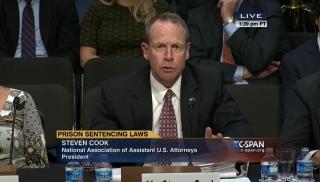"How Jeff Sessions Wants To Bring Back the War on Drugs"
The attorney general has named an unreconstructed drug warrior as a senior adviser.

Is the Trump administration going war crazy? Last week, the president launched a missile strike on a Syrian air base as retaliation for the Assad regime reportedly gassing its own people.
And now, The Washington Post reports, Attorney General Jeff Sessions, who is adamantly against marijuana legalization, is ready to escalate the war on drugs by pulling former federal prosecutor Steven H. Cook into his inner circle.
Law enforcement officials say that Sessions and Cook are preparing a plan to prosecute more drug and gun cases and pursue mandatory minimum sentences. The two men are eager to bring back the national crime strategy of the 1980s and '90s from the peak of the drug war, an approach that had fallen out of favor in recent years as minority communities grappled with the effects of mass incarceration.
Cook, who is also a former street cop credited with bringing down Chattanooga, Tennessee's biggest drug dealer, is a fan of maintaining and even increasing mandatory minimums. He believes that drug dealing is "inherently violent," as if the black-market status of drugs doesn't create a world in which contracts and deals are enforced through violence:
"Drug trafficking is inherently violent. Drug traffickers are dealing in a heavy cash business," he said on the "O'Reilly Factor" last year. "They can't resolve disputes in court. They resolve the disputes on the street, and they resolve them through violence."
For his part, Sessions has explicitly called for a return to "Just Say No" policies that included mandatory minimums and all sorts of sentencing enhancements that swelled prison populations. Calling pot "only slightly less awful" than heroin, he has also signaled that he will continue to pursue legal action against marijuana users even in states where it has been made legal for medical and recreational use.
"If there was a flickering candle of hope that remained for sentencing reform, Cook's appointment was a fire hose," said [Kevin] Ring, of FAMM [Families Against Mandatory Minimums, a leading sentencing-reform group]. "There simply aren't enough backhoes to build all the prisons it would take to realize Steve Cook's vision for America."
Read the whole Washington Post, by Sari Horwitz, story here.
Has there been a more ineffective and destructive government program than the decades-long drug war? Studies regularly show that drug laws have minimal effect on individual behavior while visiting all sorts of violence and disruption on us all. Arguably the most distressing thing about Cook is his insistence that currently illegal drugs are somehow possessed of magical properties that make dealing in them "inherently violent." If history (and common sense) tell us anything, it's that prohibition is what makes trafficking in anything "inherently violent."
When people trade in black markets, everything is ultimately enforced through violence and threats because there are no other forms of recourse. This is one of the great lessons of liquor prohibition, which abetted the rise of organized crime in the United States. Add to that the overwhelmingly positive experience with pot legalization in Colorado, which has the most robust legal market for marijuana, and the Sessions-Cook position is even more baffling. The increase in tax revenue, along with no serious increases in use among youths or in drug-related crime, has even caused Colorado Gov. John Hickenlooper to reconsider his opposition to legalization.
At least since the middle 1990s, when crime rates started dropping and staying low and medical marijuana was legalized, it seemed as America was growing up about the moral and pragmatic sagacity of making at least soft drugs such as pot available. The Sessions Justice Department is insisting on a second childhood, alas.
Related: "The Trump Administration Can't Stop Marijuana Legalization (But He Can Slow it Down)"
